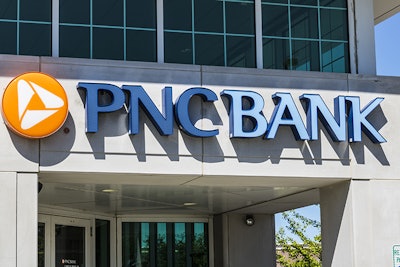
PNC Bank notified the advocacy group in June that it will close the organization’s 22-year-old accounts due to risks associated with serving an organization involved in the marijuana industry.
According to Morgan Fox, senior communications manager for Marijuana Policy Project (MPP), PNC told the group it was too risky to continue doing business with them because they accept donations from businesses that deal directly with marijuana. Fox says MPP generates most of its funding from small donors and philanthropists, but also gets a small percentage of donations from the marijuana industry, which was PNC’s primary concern.
Diane Zappas, VP, director of corporate reputation for PNC, indicated that that the bank does not comment on customer accounts, but commented to CBT, “As a federally regulated institution, PNC complies with all applicable federal laws and regulations.”
According to an article Cannabis Business Times Associate Editor Brian MacIver wrote for U.S. News & World Report, the federal government regulates banks and credit unions, meaning that financial institutions are subject to prosecution on money laundering charges for accepting clients that deal in marijuana. Even if a bank is willing to take on a marijuana business, MacIver reported, the process can be complicated with strict regulations, and if a bank accepts the business as a client, it becomes responsible for ensuring the business complies with federal and state regulations.
MPP lobbies to decriminalize marijuana, but is not involved in growing or distributing it, which is an important distinction for federally regulated banks and other institutions that deal with advocacy groups. Although many banks will not serve marijuana sellers or growers because marijuana is banned at a federal level, most policy and advocacy groups have been exceptions, according to the Washington Post, so PNC’s decision to close MPP’s accounts signals a new level of concern in the banking industry, which could be due to growing uncertainty about protections for the marijuana industry in states that have legalized it.
The Washington Post reports that many advocates are concerned that the Trump administration will start enforcing federal laws and dismantling key protections for the industry. Attorney General Jeff Sessions wrote last week to congressional leaders to ask for the ability to prosecute medical marijuana dispensaries.
According to Thomas Schultz, a former Wall Street lawyer and investment banker turned pharmaceutical executive in Connecticut, there has been news that a Department of Justice committee is reviewing the department’s position on marijuana, with the key foundation of this position originating from the second and third Cole Memos which were issued in August 2013 and February 2014. Schultz, who is president of Connecticut Pharmaceutical Solutions—one of four licensed medical marijuana producers in Connecticut—says both memos indicated that if marijuana was not crossing state lines and there was no distribution to minors, drugged driving or use of federal lands, guns or gangs, among other provisions, the Department of Justice should not spend its resources prosecuting state-legitimate and state-compliant marijuana programs.
Also in February 2014, the same day as the third Cole Memo was released, the Department of the Treasury’s Financial Crimes Enforcement Network (FinCEN) issued a memo of its own, which according to Schultz, explained to banks how they might serve state-legal marijuana businesses. Schultz says the FinCEN memo’s methodology reflects the Customer Identification Program (CIP) that banks are required to have under the Bank Secrecy Act of 1970, which helps to ensure that funds from illicit activity are not being laundered through the banking system. Under the CIP, banks are required to know their customers, and the FinCEN memo stated that banks should thus know the legal marijuana businesses they serve, including their licensing, normal operations and customers.
“With producers, it’s fairly easy because producers only have the licensed dispensaries in the state [as customers],” Schultz said in an interview with CBT. “With dispensaries, they have anybody with a card from the state who has, in effect, a license to purchase marijuana at the dispensary.”
Schultz said that by understanding the marijuana business’ normal operations, the bank can then verify to the Treasury that their customers are not laundering money from illegal sources. He says this concept is not unique to the industry—banks are required to know all their customers in this way.
Schultz points out that many businesses in the country today receive money from the sale of marijuana, and there are no effects, so in the case with MPP, the closing of their accounts is probably due to PNC’s size.
“I’m not surprised that a large bank chose to withdraw from being anywhere proximate to this business, and I’m not surprised either that otherwise nothing else is happening. That is to say, it’s not like there are 10 other stories today about banks pulling out of the industry,” Schultz said. “PNC is too unlike the typical banks operating in the industry, which are typically small banks whose management is very close to customers and who can very easily understand everything we’re doing.”
Schultz adds that small banks can make marijuana business accounts a priority, while big banks cannot. For bigger banks, he says, they have enough trouble making sure that their CIP is compliant without taking on the complicated regulations of state-legal marijuana businesses.
“Most large banks with thousands of branches have not historically been active in banking marijuana businesses. Most of the banks that are active are small, either legacy banks, meaning old banks, that have been around forever, but for whatever reason they have one or two branches, and the officers can be confident that the bank knows the businesses and has a proper Customer Identification protocol activity in place,” Schultz said. “In some sense, the surprise is that PNC was ever doing this at all.”
Schultz said he hopes the industry continues to move forward and that marijuana businesses can eventually get away from being cash-only, which would make it easier for them to pay their taxes properly and provide them with a record of financial activity.
“I think having this industry in the banks helps with compliance,” he said. “Moving this industry out of our banks is not a good thing.”
Representative Ed Perlmutter (D-CO) introduced a bill in April called The Secure and Fair Enforcement Banking Act, which would prevent federal regulators from terminating banks’ federal deposit and share insurance solely because they provide financial services to legitimate cannabis businesses.
When asked about the outlook of this bill, Fox said, “It is difficult to say at this point, but we are working with our allies on the Hill to increase support and add cosponsors.”
In the meantime, Fox says that MPP has secured alternative banking options, but the organization is keeping the details confidential at this time.
“We are actually seeing more financial institutions step in to fill the void in this area, contrary to what it may seem from this recent incident,” she said. “The trend seems to be going in the opposite direction, but if it were to reverse, it could hamper efforts to establish regulated markets. Hopefully this will not come to pass. However, it is possible that state and local institutions would fill the void if federally insured institutions become less willing to work with the industry or advocacy organizations.”
Fox also says that MPP is willing to help any allied organization that reaches out to them regarding this issue, and has been in contact with several of them already.


























